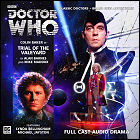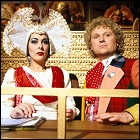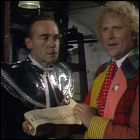 The Doctor is once again dragged into the court of the Time Lords, but this time he is sought not as the accused, but as the attorney for the accused. His client is revealed to be the Valeyard, who mercilessly prosecuted the Doctor at his own trial before being revealed as a dark, twisted future incarnation of the Doctor himself. The crimes of which the Valeyard is accused are kept classified, leaving the Doctor few avenues for defending his client, so the Doctor takes the opportunity to delve into the Valeyard’s background, trying to use the trial as a way to discover how the Valeyard came into existence. The answers prove to be both disquieting and cryptic, with the Valeyard finally admitting that he is the result of an experiment to extend a Time Lord’s regenerative life span beyond the accepted limit of 13 incarnations. The Valeyard claims to be the product of a failed bid for immortality, but whose bid? And how does the Valeyard’s very existence constitute a crime punishable by his death?
The Doctor is once again dragged into the court of the Time Lords, but this time he is sought not as the accused, but as the attorney for the accused. His client is revealed to be the Valeyard, who mercilessly prosecuted the Doctor at his own trial before being revealed as a dark, twisted future incarnation of the Doctor himself. The crimes of which the Valeyard is accused are kept classified, leaving the Doctor few avenues for defending his client, so the Doctor takes the opportunity to delve into the Valeyard’s background, trying to use the trial as a way to discover how the Valeyard came into existence. The answers prove to be both disquieting and cryptic, with the Valeyard finally admitting that he is the result of an experiment to extend a Time Lord’s regenerative life span beyond the accepted limit of 13 incarnations. The Valeyard claims to be the product of a failed bid for immortality, but whose bid? And how does the Valeyard’s very existence constitute a crime punishable by his death?
written by Alan Barnes & Mike Maddox
directed by Barnaby Edwards
music by Andy Hardwick / ERSCast: Colin Baker (The Doctor), Michael Jayston (The Valeyard), Lynda Bellingham (The Inquisitor)
Notes: The Doctor’s symbiotic nuclei are mentioned; first mentioned in The Two Doctors (1985), these cells play a role in the regeneration process and, when subjected to the Rassilon Imprimatur, enable Time Lords to travel through time with no ill effects. The Valeyard foreshadows the seventh Doctor as a manipulative chess master, and the eighth Doctor as a man trying to “escape the shadow of death”, which was probably intended, at the time of writing, to refer to the events of the audio story To The Death and the Dark Eyes saga that followed, but can also be applied to the eighth Doctor’s avoidance of fighting in the Time War (Night Of The Doctor). The Doctor’s school nickname, Theta Sigma, was first revealed in the television story The Armageddon Factor (1978), and hints of it have continued to appear in other media as well as the TV series.
LogBook entry and TheatEar review by Earl Green
Review: A nifty one-off that almost requires listeners to reacquaint themselves with The Trial Of A Time Lord ahead of time, The Trial Of The Valeyard drags the sixth Doctor back into the dread courtroom of the Time Lords, this time to defend his new arch-nemesis. If nothing else, it demonstrates that, over a quarter of a centtury after the fact, we’re still trying to unravel some of the loose ends surrounding the Valeyard. Name-checked among the Doctor’s aliases on TV in The Name Of The Doctor, the Valeyard is the loose end  that won’t go away. Nor should he, really – with the TV series’ recent revelations about the number of regenerations available to the Doctor, there are plenty more slots into which the Valeyard could now be dropped. Rather than invalidating him out of the entire series (as plenty of folks would probably like to do), Trial Of The Valeyard begins to set up an origin story that explains his Time Lord origins and also addresses the nebulous claim, from Trial Of A Time Lord, that the Valeyard is an “aspect” of the Doctor from “between his 12th and final incarnation.” Of course, Time Of The Doctor has muddied these waters significantly: is the Valeyard the incarnation after Peter Capaldi, or has the Valeyard been pushed out even further than that to some unspecified point in the future? Assuming the Doctor now has 13 new lives, “between his 12th and final incarnation” leaves a lot of ground to cover.
that won’t go away. Nor should he, really – with the TV series’ recent revelations about the number of regenerations available to the Doctor, there are plenty more slots into which the Valeyard could now be dropped. Rather than invalidating him out of the entire series (as plenty of folks would probably like to do), Trial Of The Valeyard begins to set up an origin story that explains his Time Lord origins and also addresses the nebulous claim, from Trial Of A Time Lord, that the Valeyard is an “aspect” of the Doctor from “between his 12th and final incarnation.” Of course, Time Of The Doctor has muddied these waters significantly: is the Valeyard the incarnation after Peter Capaldi, or has the Valeyard been pushed out even further than that to some unspecified point in the future? Assuming the Doctor now has 13 new lives, “between his 12th and final incarnation” leaves a lot of ground to cover.
The revelations of Trial Of The Valeyard throw their own mud into the proceedings by revealing that the Valeyard is and isn’t a future incarnation of the Doctor. If you want a more precise origin story than that for the Valeyard, you won’t find it here – Trial is a lot of tease and not a lot of payoff. Once again, the Valeyard is running a number on everyone’s head, especially the Doctor’s, for his own reasons, and once again, the Time Lords convened to hear the Valeyard’s  case almost certainly have their own agendas. (By the end of the story, the only character you can trust in the entire scenario is the Doctor himself.) How much of his story of spending an orphan’s life in one of Gallifrey’s “Shadow Houses” and having biodata curiously compatible with the Doctor’s own is true, there’s no way of knowing – as always, one can be sure of only one thing: the Valeyard is saying what he’s saying for his own reasons. (And after all these years, it’s important to remember that we have only the Master’s word to go on where the Valeyard’s “future Doctor” status is concerned. Nothing can be taken for face value.)
case almost certainly have their own agendas. (By the end of the story, the only character you can trust in the entire scenario is the Doctor himself.) How much of his story of spending an orphan’s life in one of Gallifrey’s “Shadow Houses” and having biodata curiously compatible with the Doctor’s own is true, there’s no way of knowing – as always, one can be sure of only one thing: the Valeyard is saying what he’s saying for his own reasons. (And after all these years, it’s important to remember that we have only the Master’s word to go on where the Valeyard’s “future Doctor” status is concerned. Nothing can be taken for face value.)
As much as some fans would like to not spend a lot of time following up on the Valeyard, I find that his “taboo” status makes him that much more fascinating. Hopefully Big Finish is open to engaging the services of Michael Jayston once more for a rematch. The catharsis of spurious morality all but demands it – and when even Steven Moffat is bringing up the spectre of the original series’ most vaguely-defined villain, he clearly isn’t going to stay forgotten. If a rematch is forthcoming, as fascinating as it would be to hear Jayston against different Doctors, he works so well against Colin Baker. Both have such a command of language that no script is too wordy for them – and they certainly don’t turn in anything less than an engrossing tandem performance.
The Valeyard is still out there. Big Finish knows it. It even sounds like Steven Moffat knows it. Bring him on.
